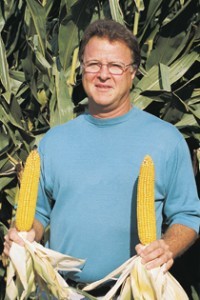Initiative for a Carbon Negative Economy
Ken Cassman
 Ken Cassman is Heuermann Professor of Agronomy at the University of Nebraska-Lincoln and Chair of the Independent Science and Partnership Council of the CGIAR. His research interests include soil fertility and plant nutrition; crop ecophysiology and yield potential; crop water productivity; nutrient cycling processes; soil quality and sustainability of intensive cropping systems; global food security. The need to meet food demand without degrading environmental quality and natural resources provides the central theme of his work. It’s estimated food production must double by 2050 to provision 9+ billion people with an adequate diet. To protect rain forests, wetlands, and savannahs from conversion to agriculture, the additional food supply cannot come from expansion of crop and livestock production area. Moreover, agricultural systems need to contribute proactively to solving the most pressing environmental problems facing humankind (climate change, conservation of biodiversity, pollution) because agriculture occupies 33% of the earth’s terrestrial surface and sues 70% of all developed freshwater. Hence, the goal of Ken’s research is to find ways to increase crop yields substantially without compromising the quality of soil and water resources or damaging the integrity of natural ecosystems-a process call ecological intensification. Ken’s current work focuses on understanding how to achieve crop yields that approach the genetic yield ceiling (potential yield) with highest possible efficiencies in use of water, nutrients, and energy. Crop simulation models and life cycle assessment are important tools supporting this work. Another major effort involves a global collaboration to develop a Global Yield Gap Atlas that provides best available estimates of the gap between current average farm yields and the potential yield ceiling for the major food crops. The Atlas provides critical information to guide development policies and research prioritization at global and national levels, while it also supports yield gap analysis at local to regional levels to identify major limiting constraints to increase food production.
Ken Cassman is Heuermann Professor of Agronomy at the University of Nebraska-Lincoln and Chair of the Independent Science and Partnership Council of the CGIAR. His research interests include soil fertility and plant nutrition; crop ecophysiology and yield potential; crop water productivity; nutrient cycling processes; soil quality and sustainability of intensive cropping systems; global food security. The need to meet food demand without degrading environmental quality and natural resources provides the central theme of his work. It’s estimated food production must double by 2050 to provision 9+ billion people with an adequate diet. To protect rain forests, wetlands, and savannahs from conversion to agriculture, the additional food supply cannot come from expansion of crop and livestock production area. Moreover, agricultural systems need to contribute proactively to solving the most pressing environmental problems facing humankind (climate change, conservation of biodiversity, pollution) because agriculture occupies 33% of the earth’s terrestrial surface and sues 70% of all developed freshwater. Hence, the goal of Ken’s research is to find ways to increase crop yields substantially without compromising the quality of soil and water resources or damaging the integrity of natural ecosystems-a process call ecological intensification. Ken’s current work focuses on understanding how to achieve crop yields that approach the genetic yield ceiling (potential yield) with highest possible efficiencies in use of water, nutrients, and energy. Crop simulation models and life cycle assessment are important tools supporting this work. Another major effort involves a global collaboration to develop a Global Yield Gap Atlas that provides best available estimates of the gap between current average farm yields and the potential yield ceiling for the major food crops. The Atlas provides critical information to guide development policies and research prioritization at global and national levels, while it also supports yield gap analysis at local to regional levels to identify major limiting constraints to increase food production.